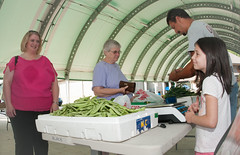What is Community Supported Agriculture?
Chances are you may have heard of farm sharing programs or Community Supported Agriculture programs (CSAs). They have received a lot of publicity and media exposure in recent years for their ability to help bring real food back to the table every night and support local economies at the same time. CSAs are instrumental in helping people to access fresh, local foods directly from the farmer that grows it.
Small farmers are at a disadvantage these days. They simply cannot compete with large scale farms that sell to major grocery store chains. Small farmers usually have to sell to their neighbors, at the roadside, or at farmer's markets. They have had to work hard to find a customer base and unlike large agribusiness operations, small farmers might find themselves out of business the very first time their crops are destroyed or fail to thrive. Realizing that small farm operations might soon be gone with the wind some of them got creative and decided to extend an inv itation to their local communities in the form of CSAs.
Local consumers have answered their call. The offerings of a large chain store have often traveled thousands of miles from farm to plate and this certainly impacts their freshness, taste, and nutritional value. The transportation of food across the world also impacts our planet negatively, contributing to pollution and the emission of greenhouse gases that cause global warming. The importance of eating fresh, local foods is more apparent then ever and the CSA arrangement is helping meet this need.
CSAs work when farmers pre-sell a portion or a share of their harvest to local residents. The residents usually pay a fee seasonally and in return they get a box of fresh, farm fruits and veggies every week. The farmers have more freedom, security, and flexibility when their costs and products are paid for up front. The consumer benefits by having continuous access to local and healthful foods. The consumer also ab sorbs some of the risk involved in farm management because if the crops fail or are destroyed by natural disaster or some other unforeseen circumstance the farmer has already been paid and he or she will not be forced out of business. The consumer, although unhappy to see no product for their investment, is satisfied in supporting his local community and protecting his local food sources.
Some CSAs also allow you to pay for your farm share or a portion of it in trade for labor. You might be put to work weeding, harvesting, packaging CSA boxes, or delivering food. This arrangement keeps costs down for the farmer and the consumer all the while helping the consumer to connect with the food cycle that feeds him or her in an intimate way.
Other benefits of joining a CSA include the opportunity to eat new and different foods and to try new recipes so as to exhaust your weekly share before a new one arrives. This usually means the whole family starts eating healthy vegg ies and leafy greens more frequently. Joining a CSA in your area might be one of the best things you can do support your local economy and make a commitment to healthy eating!
Tiffany Washko is the editor of Nature Moms, http://www.naturemoms.com and Raw Kids Recipes, http://www.rawkidsrecipes.com After working several years in corporate health care marketing and public relations, she took time away to be a mother. This new pursuit lead her to a new passion, natural family living and writing about environmental and political issues. She currently works as a freelance writer and newspaper journalist.
Article Source: http://EzineArticles.com/?expert=Tiffany_Washko
